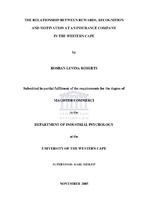The relationship between rewards, recognition and motivation at an insurance company in the Western Cape
Abstract
Increasingly, organisations are realising that they have to establish an equitable balance between the employee’s contribution to the organisation and the organisation’s contribution to the employee. Establishing this balance is one of the main reasons to reward and recognise employees. Organisations that follow a strategic approach to creating this balance focus on the three main components of a reward system, which includes, compensation, benefits and recognition (Deeprose, 1994). Studies that have been conducted on the topic indicates that the most common problem in organisations today is that they miss the important component of recognition, which is the low-cost, high-return ingredient to a well-balanced reward system. A key focus of recognition is to make employees feel appreciated and valued (Sarvadi, 2005). Research has proven that employees who get recognised tend to have higher self-esteem, more confidence, more willingness to take on new challenges and more eagerness to be innovative (Mason, 2001). The aim of this study is to investigate whether rewards and recognition has an impact on employee motivation. A biographical and Work Motivation Questionnaire was administered to respondents (De Beer, 1987). The sample group (N= 184) consists of male and female employees on post-grade levels 5 to 12. The results of the research indicated that there is a positive relationship between rewards, recognition and motivation. The results also revealed that women, and employees from non-white racial backgrounds experienced lower levels of rewards, recognition and motivation. Future research on the latter issues could yield interesting insights into the different factors that motivate employees. Notwithstanding the insights derived from the current research, results need to be interpreted with caution since a convenience sample was used, thereby restricting the generalisability to the wider population.

